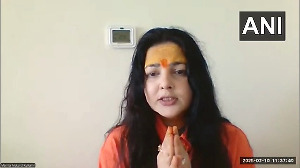"I was born and grew up in a three-room flat on 202 Chittaranjan Avenue.There were five of us and only one bathroom. I still remember the torture in the mornings when all of us used to queue outside the toilet. Since
then I have an obsession with big bathrooms. Every room in my Greater Kailash House has a bathroom. I've seen those days; I left home because I didn't want to continue with my father's trading business. I had nothing.
Proud fathers get suits stitched for their sons. I paid for my first suit myself, when I was 28. Those 10 years were a period of great struggle. I'm afraid of nothing. What's the worst that can happen? That I have to return
to those days? So what? I've survived them once already."
Who said this?
The king of the politics of possibilities - Amar Singh, and he is back in action. Few have the ability to network and manipulate the levers of power as Singh does. Expect turbulence ahead.
Singh began the Samajwadi Party's (SP) reincarnation in national politics in the first week of July - as a friend and supporter of the Congress - with the statement: "We're not wheelers and dealers. We don't want anything from the relationship". Till then he had just been a friend and well-wisher of Prime Minister Manmohan Singh. Now he has the onerous responsibility of keeping the United Progressive Alliance (UPA) afloat. So who is this man ?
In small towns, there is a class of traders and businessmen that rushed to open demat accounts last year. For them, Amar Singh is the symbol of what they can achieve. He's known as the man who can make things work. He is unashamedly feudal in the way he does business, but he can leverage and network to get doors opened. Singh has never been less-than-frank about his abilities. His first memorable business deal was for Vam Organics, where he worked.
"Alcohol-based chemical industries were booming as long as I was there," he said. The industrial alcohol market was tightly-regimented and controlled by the UP government. How did he manage to make a success of business in that environment? "By networking -through bureaucratic and political networking" he said.
From then to now, it has been a long journey. Having traded the black safari suit for the kurta pyjama, in the 1980s Singh faced betrayal from the Congress Party, that promised him a seat from Madhya Pradesh. He joined the Samajwadi Party because he had something he could offer to the SP and the SP had something it could give him. Mulayam Singh Yadav recognised the merit of a man who was content being the bridesmaid, never the bride. He never interfered in Amar Singh's business plans for the SP.
And Singh had many. As a politician, he was born at the cusp of the birth of India's second-generation economic reforms programme. Successive unstable governments in the late 1990s, in an environment of half-done reforms, afforded unique opportunities to gain considerable leverage - Singh taught Mulayam Singh Yadav how to utilise it. From someone who was adept at getting his work done by babus, Singh graduated to someone who could now order babus to work.
But his field of political operation continued to be Uttar Pradesh. When the Samajwadi Party came to power in UP, Singh launched, with great enthusiasm and fanfare, administrative structures that he said would change the face of the state. To his credit, he tried to modernise a moribund system by making it more corporate, more responsive. A UP Development Council, a system that was corporate-compatible, single-window systems, revamping, privatisation.
Despite Singh's best efforts, it didn't work. Too much else intervened: demands of day-to-day politics, UP's existential contradictions and the standard UP politician's inability to see beyond his nose. Again, there were many to take advantage of a measure only half done. It was Mulayam Singh Yadav who privatised 24 state-owned sugar mills in UP in 2003 as chief minister, but the issue was mired in controversy as all the mills were to be handed over to one particular industrial house, that has now emerged as the largest sugar producer in the country.
Singh does not agree, but UP was in a shambles because Mulayam Singh's Yadav's tenure started out as modern and visionary - with considerable credit due to Amar Singh - but got bogged down in Yadav's family politics,
mismanagement and his disproportionate assets cases (one is being reviewed by the Supreme Court). Singh will also dispute this vigorously, but somewhere along the line, he also lost interest in modernising UP, content with just going with the flow.
But today, the man has something to prove once again. With his uncanny ability to bring people representing disparate interests together on one platform, he can be your best friend, or your worst enemy. The Congress has to decide which it wants him to be.







 © 2025
© 2025